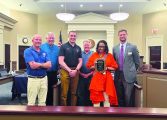Contributed by Mike Feazel
A program to provide special assistance to children in foster care is expanding into Fluvanna County and Lake Monticello, with plans to reach Madison and Orange counties sometime in the future.
The Piedmont Court Appointed Special Advocate (CASA) program is part of a nationwide program that has been assisting children for about 45 years, said Piedmont CASA President Kate Duvall. The program has been operating in Charlottesville, Albemarle and other nearby counties for decades but “I’ve always been sad that there are three counties without it,” she said.
CASA provides volunteers, backed by professional staffers, to advocate for every child in foster care, particularly by being a “touchstone for them” and by being “the eyes and the ears” for the judge who oversees their care, said Paul Seehaver, a former Lake Monticello resident who was a CASA volunteer for years.
“CASA’s job is to learn about each individual child and their individual situation through personal contact,” Seehaver said, adding that CASA volunteers meet with the child or sibling group at least monthly, just to talk with them and see how they’re doing. The volunteers also do research and have access to private records, due to court orders.
The result is often a report to the court, making recommendations about the foster child’s future care. CASA volunteers are typically one of three voices influencing court decisions on future care – along with a social worker and an attorney assigned to each child. Seehaver said CASA volunteers often have more freedom in their recommendations than social workers and attorneys who are government paid and managed.
“What is unique about a CASA volunteer is that we are an independent voice, advocating for the best interests of the child in an independent and very focused way,” Duvall said. “Our volunteers work for one child or sibling group at a time.”
Piedmont CASA hopes to have Fluvanna and Lake residents begin training this fall to become child advocates, Duvall said. She said volunteers need no special advance training or background: “We have former teachers, retired lawyers, veterans, stay-at-home moms, you name it.”
Volunteers go through an interview screening process and must pass a background check. Then they take about 35 hours of training. Seehaver said they have access to monthly training sessions at which they can discuss situations with trained CASA staff.
Fluvanna typically has 18-20 children in foster care at a time, Duvall said, so CASA is looking for about that number of additional volunteers. CASA said about a half dozen local residents have already expressed interest, and others are signing up for an informal county advisory committee.
Being a CASA volunteer is “very rewarding,” but also sometimes “emotionally difficult,” Seehaver said. “I felt like I was providing a very needed and very legitimate service to these kids.” He said it has been “very gratifying” to see judges rely heavily on the CASA volunteers’ reports in making decisions on children’s futures. He said he spent about 20 hours each of the first six months working for each child, but once the research was done the workload dropped off to 6-8 hours per month.
“This is not a phone-it-in job,” Seehaver said. “It’s a genuine commitment. And there is some emotion involved. But you feel like you can really make a difference.”
Information about CASA and volunteering, as well as an opportunity to sign up, is at www.pcasa.org.




